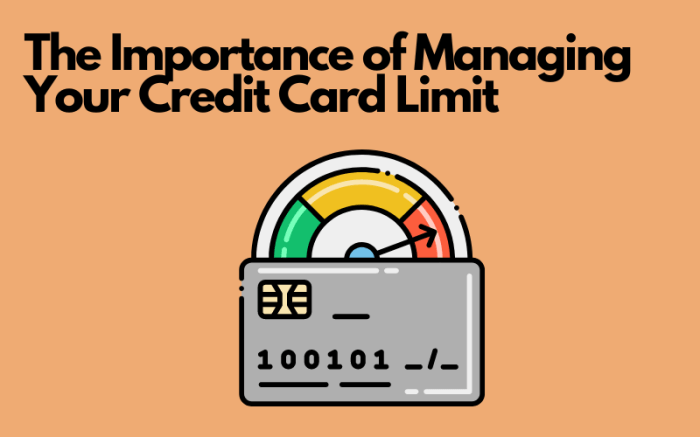Yo, peeps! Welcome to the ultimate guide on credit card limit management. This topic is all about keeping your finances in check and making sure you’re on top of your credit game. So, buckle up and get ready to dive into the world of credit card limits!
In this guide, we’ll break down the importance of managing your credit card limits, discuss factors that influence these limits, explore strategies to increase them, and highlight the risks of going over your limit. Let’s get started!
Importance of Credit Card Limit Management

Managing your credit card limits is crucial for your financial health. It can impact your credit scores and overall financial well-being.
How Credit Card Limits Impact Credit Scores
Your credit card limits play a significant role in determining your credit scores. The credit utilization ratio, which is the amount of credit you are using compared to the total credit available to you, is a key factor in calculating your credit scores. Keeping your credit card balances low in relation to your credit limits can positively impact your credit scores.
Strategies for Effectively Managing Credit Card Limits
- Regularly monitor your credit card balances to ensure you are not exceeding your credit limits.
- Avoid maxing out your credit cards, as this can negatively impact your credit scores.
- Contact your credit card issuer if you need to increase or decrease your credit limits based on your financial situation.
- Consider setting up automatic alerts to notify you when you are approaching your credit limits.
- Paying off your credit card balances in full and on time each month can help you manage your credit limits effectively.
Factors Influencing Credit Card Limits
When it comes to determining an individual’s credit card limit, several key factors come into play. These factors can vary from person to person based on their financial situation and credit history.
Income Level
Income level is a significant factor that influences credit card limits. Lenders typically consider an individual’s income to assess their ability to repay the credit card debt. Higher income levels often result in higher credit limits, as it indicates a greater capacity to handle debt responsibly.
Credit History
Credit history plays a crucial role in setting credit card limits. Lenders review an individual’s credit report to evaluate their creditworthiness. A positive credit history with a history of making timely payments and maintaining low credit utilization can lead to higher credit limits. On the other hand, a poor credit history with missed payments or high levels of debt may result in lower credit limits.
Strategies to Increase Credit Card Limits
Increasing your credit card limit can provide more flexibility and financial freedom. Here are some strategies to help you boost your credit card limit:
Requesting a Credit Limit Increase
When requesting a credit limit increase from your credit card issuer, follow these steps:
- Contact your credit card issuer through their customer service hotline or online portal.
- Express your interest in increasing your credit limit and provide reasons why you believe you deserve a higher limit.
- Be prepared to share information about your income, employment status, and any other relevant financial details.
- Ask if a hard inquiry will be required for the credit limit increase, as this can temporarily impact your credit score.
- Follow up on your request if you do not receive an immediate decision.
Improving Creditworthiness for a Higher Limit
To enhance your creditworthiness and qualify for a higher credit limit, consider the following tips:
- Make timely payments on all your bills, not just your credit card bills, to show responsible financial behavior.
- Keep your credit utilization ratio low by using only a small portion of your available credit.
- Regularly check your credit report for errors and dispute any inaccuracies to maintain a clean credit history.
- Avoid opening multiple new credit accounts in a short period, as this can signal financial distress to creditors.
Impact of Credit Utilization Ratio
Your credit utilization ratio, which is the amount of credit you are using compared to your total available credit, plays a significant role in credit limit increments.
Keeping your credit utilization ratio below 30% is recommended to demonstrate responsible credit usage and increase the likelihood of receiving a credit limit increase.
By managing your credit card usage wisely and maintaining a healthy credit profile, you can position yourself for a higher credit limit in the future.
Risks of Exceeding Credit Card Limits
Exceeding your credit card limit can have serious consequences that can negatively impact your financial health. It is important to be aware of these risks to avoid falling into debt and damaging your credit score.
Consequences of Exceeding the Credit Card Limit
- Overlimit Fees: When you exceed your credit card limit, the issuer may charge you a fee for each transaction that puts you over the limit.
- Interest Rate Increase: Exceeding your credit card limit can lead to an increase in your interest rate, making it more expensive to carry a balance.
- Credit Score Damage: Exceeding your credit limit can negatively impact your credit score, as it shows that you are not managing your credit responsibly.
Negative Impact on Credit Scores
- Utilization Ratio Increase: Exceeding your credit card limit increases your credit utilization ratio, which is a key factor in determining your credit score. High credit utilization can lower your score.
- Payment History: Exceeding your credit limit can also lead to missed payments if you are unable to pay off the excess amount. Payment history is a significant factor in credit scoring models.
Fees and Penalties Associated with Surpassing Credit Card Limits
- Overlimit Fees: Credit card issuers may charge you a fee for each transaction that exceeds your credit limit, adding to your debt.
- Interest Charges: In addition to overlimit fees, you may also incur higher interest charges on the amount that exceeds your credit limit.
